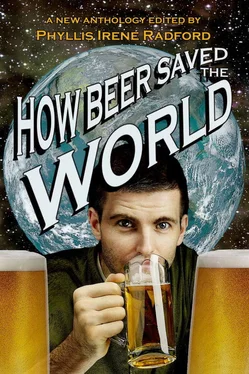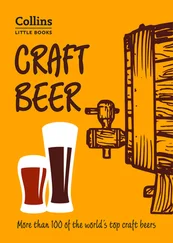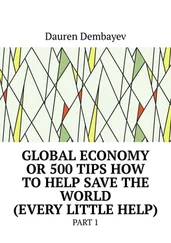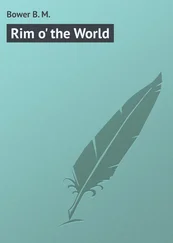I looked at him a long moment. “You gotta pee.”
He nodded his head vigorously. “I gotta pee.”
“Well—” Exasperated, I looked around as if looking for a place to do that and came to my senses. “I’m sure whoever has abducted us has probably had all sorts of stuff spilled on the floor from their examinations. Go ahead and piss.”
He turned, went to the nearest wall and began to let go—and stopped. “My God!” He pointed, “my God—”
I came over to look. Where he had pissed on the wall, that part of the wall—had melted. Eagerly, I tried. Not as much came of my effort but certainly part of the wall where I had done my duty had obviously softened.
“Yeah,” I said, “whatever that beer does to your piss sure doesn’t work for this place.”
I saw Mac relax and I smiled. A weapon?
Dong in hand, Mac went over to the counter with all the formidable and weird medical-looking paraphernalia and said, “No, no, not tonight, dear. I don’t want an examination.”
And he promptly aimed a forceful yellow stream all over the equipment and the shelf.
Wow! I don’t know what beer did to Mac’s pee—maybe it was coincidental, I dunno, but the instruments acted like they’d been hit by a laser; everything just— melted, shriveled up and gave off a God-awful acrid odor of piss as if mixed with sulfur and garlic. The metal shrieked, squealed as if they were living entitles that had somehow taken on static forms of instruments.
At that point, part of the wall yanked back, revealing our captors who looked like somehow feminized lizards: big dark, soulful eyes, more or less set as if to give binocular vision, no nose, grayish-green skin and dressed in some sort of body-hugging, synthetic wrap, almost as if sprayed on. They looked around, pointed and squealed, I assume in shock.
We turned and faced our abductors directly. Mac still had his “weapon” in his hand. I pulled down my zipper and found my own, guessing that our friends had seen the damage Mac had done, I could only assume I could do the same. We approached. Then stopped, raised our formidable weapons and made like we were going to fire.
Our friends screeched. Blam! The wall slammed shut. Golden light.
And we found ourselves flat on our backs on the parking lot outside the Lumber Jack. We looked up in time to see the star streak away at high speed eastward. Suddenly, I imagined a vast armada of glowing ships heading toward Earth, then abruptly stopping as if hitting a wall—then suddenly retreating. For a few minutes I guess, we both conked out, maybe from shock or relief combined with the effects of the beer. Anyway, when I came to, Mac was trying to sit up.
“You get a picture in your head before we zoned out of a bunch of ships in retreat?” I asked. “A mass-mind telepathic command to am-scray?”
Smiling hugely, Mac slowly got to his feet and gave me a hand.
“Yup,” he laughed. “Maybe having a small bladder ain’t so bad. Maybe what beer does to me ain’t so bad either. Certainly saved the world from alien invasion tonight.”
“That it did,” I said, “that it did. Suggest we celebrate and have another round.”
“Sounds great,” said Mac, “but first,” he turned his back discreetly.
“I know,” I laughed. “I know. But first—you gotta pee.”
Mad Gus Missteps
From the ‘Legends of Beer’ Catalogue: Volume 17, Canto 210
Mark J. Ferrari & Shannon Page
The following is transcribed from an interview with extremely aged (1) German pig farmer Gustavo Dourtmundschtradel, conducted in English(2) by Roland Halifax, an oral history researcher from Bisonford University in Littleville, Iowa, (3) originally recorded on November 22nd, 1993 at Gustavo’s ancestral farmhouse in the hamlet of Frauschlesundmunster. (4)
RH: Thank you for agreeing to speak with me, Herr Dourtmundschtradel .
GD: A man of my age is of no further use with the pigs, Herr Halifax. It is good to have some other occupation—and to hope, of course, that some of my ancestral lore may be preserved… For some more appreciative audience, perhaps, than my dummkopf (5) son, who never believes a word I speak… and his even dimmer offspring with their video games and little music players. ( Thoughtful pause ) I must confess to fearing that the Dourtmundschtradel line is failing. Soon, our stories may be all that remains of us.
RH: Ah… Well then… What story would you like to start with?
GD: It is always best to start at the beginning, ja ?(6) So I will tell you first, Herr Halifax, the oldest story in my family’s possession. A tale of the liberation of Durn in Schkerrinwald—the place from which my line originates, too many centuries ago to count now.
RH: Can you give me even an approximate century in which to place this account?
GD: Ach du Lieber Himmel . (7) No, lad. My tale comes from a time before centuries had been invented. This is from the… How is it in English?… The Jahren sehr lange Geschichten . (8)
RH: Good heavens! (9) That’s quite an old story! However did you come by it?
GD: I had it from my father.
RH: And… do you know how he came by it?
GD: Had it from his father, of course—who had it from his father, and so on. I am 91 years old, Herr Halifax. The time we have is maybe short to waste on such trivialities, ja ?
RH: Sorry. Do go on.
GD: Well, as you will no doubt have heard, Europe was a dark place to be living in those days. But even by such standards, the isolated village of Durn was darker than most. It had many nicknames then, all of them words for misery of one kind or another.
RH: I’ve never heard of any Durn Village.
GD: Of course not. It was gone not long after this story transpired. The meager valley to which it clung was but an inhospitable rent in the high mountains of Schkerrinwald.
RH: Where is Schkerrinwald, exactly?
GD: Gone as well—a mere century or two after Durn. The whole empire of Vorkenfast was never more than one of many tenuous experiments in kingdom-craft back then.
RH: I must confess, I’ve never heard of an empire named Vorkenfast either.
GD: How could you have? I would never have heard of it myself, were my people not descended from the place. (10) And yet, out of Durn, meanest village of Schkerrinwald, least kingdom of the tenuous Vorkenfast Empire, came the greatest blessing ever bestowed upon Europe.
RH: Which was…?
GD: Why, beer , of course! (11) And my own many-times-great-grandfather was the man who first brought that golden gift into the land of Germany.
RH: I’m sorry… Did you just say… that your family introduced beer to Germany?
GD: Ja . (12)
RH: ( Unintelligible sounds of surprise and/or confusion. )
GD: Before you inform me once again that you have never heard of this, Herr Halifax, allow me to concede that any tangible evidence of this claim vanished with my ancient ancestors, which is why I have never elected to tell even my disappointing son of this secret handed down through so many of my forefathers. I have no doubt of the tale’s veracity. Neither my father, nor any of his fathers were liars—or fools. (13) My son, alas, is the first of us for that. But I am German,(14) and my people do not so much enjoy playing the laughingstock as do those of your young country, so I have kept silent until now. You seem a pleasant fellow, wise enough to value the past more than most, but if you think my tale too improbable, let us leave it and proceed to some other.
RH: No, no! Please, Herr Dourtmundschtradel, continue. I’m quite fascinated.
GD: Very well, then…
Читать дальше











